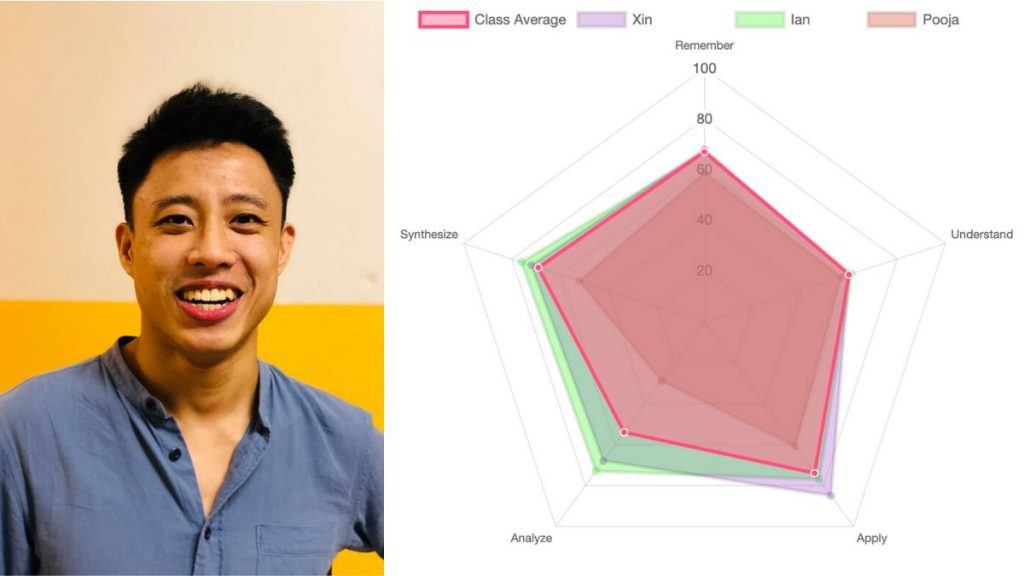Author’s Blurb: Everyone learns differently. I did well in certain subjects like Maths and English, but did badly in others. I don’t think that it was because I had lousy teachers for the other subjects, or that I wasn’t studying. It was more like their teaching style just wasn’t getting through to me.
It’s tough for teachers to cater to every individual student’s needs. Ask Brian Tang, he knows this all too well.
His students were 2 months away from their IGCSEs and he wasn’t sure what topics he should be focusing on more.
Realising he needed additional information on how his students were performing, he took their exam papers, went through each question and keyed in how much they scored individually into an Excel spreadsheet.
2 hours later, he’d generated a simple table that showed where most of them lost their marks. He then taught his remaining classes guided by this crude table.
In June 2019, he decided to take this method to the next level and developed Abelytics (Abel).

The Problem Statements
Abel is a system that helps teachers identify their students’ weak topics in a subject so they can provide targeted tutoring.
“Is this really so important?” you ask. According to Brian, yes, because the problem is threefold.
Firstly, student needs are often overlooked.
“Chiefly, this is a problem of any standardised education framework. Each students’ weakness and/or strengths are not given due weight; instead, when homework is allocated, it is done so across the board,” he said.
The weak student is expected to achieve the same level of performance as the better abled one.
Brian Tang, founder of Abelytics
Secondly, teachers are overworked.
“The natural question of why student needs are being overlooked can partly be placed on teacher workload. When you are pressed for time, you don’t think so much about the individual student—you can’t.”
“This leads to stunted understanding of where your students are at,” Brian explained.
Thirdly, schools lack a systematic data collection framework, so Abel has taken this into its own hands and simplified the process.
Personalised Learning
The process of using Abel starts with the students who input the data themselves through their Abel accounts, which takes only 5 minutes per student since the process has been streamlined.

“This is an order of magnitude faster than the traditional way of teachers inputting data for the entire class, and with much higher granular control,” Brian said.
By involving the students in the management process, it gives them a sense of responsibility and ownership over their own data.
Abel will then run data analyses to give teachers visualisations to identify patterns, and provide recommendations like, “You should reteach Electromagnetism because X% of students scored below the minimum Y%”.

Teachers get to track these recommendations, much like their own to-do list.
This entire system was developed in-house, and it took 4 months for the team to get from idea to the first iteration of building and testing the data collection and visualisation.
It took another month for the recommendation feature, and another 2 months to deploy the homework assignment.

By September 2019, Abel went into private beta and was present in 2 schools.
Teachers Deserve Better
At the moment, Abel is serving private schools, though Brian said that in reality, any committed teacher (even those in tuition centres) or a parent can use Abel.
For a school to get started on it, a test run would be planned for a single class and teacher, whom the team would register accounts for.
The teacher will be shown how to use the app effectively, after which, they’ll run through it on their own. 3 months later, the school would give their feedback on Abelytics.

For schools that have under 300 students, the pricing would be RM8/student monthly, and for those with more than 300 students, you’d have to enquire for the pricing.
On the other hand, should an individual teacher opt to use Abel without any directive from their school, it’s free to use forever.
Brian explained, “While it is part of our user acquisition strategy, we also note the burdens teachers already have to bear. Giving Abel for free to improve education is the least we can do.”
A model that he looks up to comes from an overseas startup called Gradescope. Thus, Abel’s primary method of monetisation is charging schools.
Challenging The Status Quo
To improve the platform, Brian wants to expand its homework bank of questions to include more subjects and cover more past year questions, school-level cohort reporting, and creating lesson plan templates, among many other features.
Their overall game plan is to expand further into the private education sector and build a stronger rapport there.
With the experience under their belt, they then hope to approach the MOE for a public sector push.
As attractive of a solution Abel may sound like, the industry it’s trying to cater to is still a tough nut to crack.
One of the main challenges they faced was raising awareness on why our way of education in Malaysia needs to level up.
“Educational institutions, like any monolithic structure, are usually content with the status quo. And teachers are overworked, so introducing an additional tool to have to use is an obstacle in itself.”
“But I’m convinced if Abel can deliver just 10% improvement to your students’ grades across the board, surely it is worthwhile,” Brian said.
Bottom Line: Personally, I’m drawn to Abel’s concept. Both of my parents are teachers themselves, and seeing how hard they’ve worked all these years has always made me appreciate my teachers’ efforts. Sure, I may not have liked some of them, but I always tried to do my best in their classes. So, I see this solution that can make their work easier as a big A+.
- You can read about other edutech startups we’ve written about here.
Featured Image Credit: Abelytics













